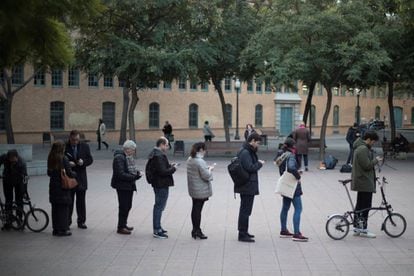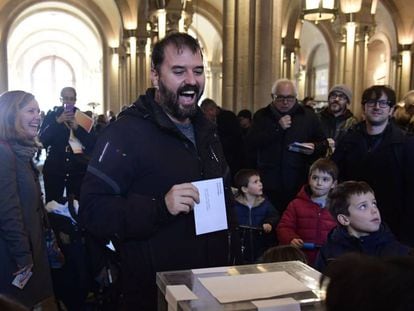An uncertain future
Pro-independence forces have held on but will need the radical CUP to govern

The 70 seats obtained by Junts per Catalunya (JxC), the Catalan Republican Left (ERC) and the Popular Unity Candidacy (CUP) at the regional election held yesterday in Catalonia do nothing to clear up the political landscape. After all the tension of the last two years, a society as exhausted and fractured as Catalonia deserved a breather in order to restore civic and institutional normality in the region, and to improve its image and prestige in the eyes of fellow Spaniards.
The outcome of the election heralds an uncertain beginning to this new political term: the results include some very promising elements, some less stimulating ones, and taken as a whole it does not look like they will automatically stabilize Catalan political life.
There will be a temptation to use this absolute majority to stoke the political and social conflict
Any eventual absolute majority by the secessionists – eventual because it will not be an easy thing to formalize – would hinder this necessary return to normality, forcing the supporters of self-government and the Constitution, in Catalonia and elsewhere in Spain, to stand firm in the opposition and keep trying to build an alternative.
The most positive aspect of the December 21 election is the significant victory secured by the constitutional party Ciudadanos under its candidate Inés Arrimadas, both in votes (nearly 1,100,000) and seats (37). In different circumstances, such a meteoric rise would put her in top spot in the bid to get invested by parliament as the region’s new premier. But in the current scenario, her victory at the polls does not open the door to a change in cycle.
Another equally positive figure to emerge from the election is the separatist camp’s loss of seats (from 72 in 2015 to 70) and popular votes, which have gone down by a few tenths of a point. Just as was the case in the regional election of 2015, the pro-independence movement has failed to secure a clear majority of votes. Its new majority is weaker because of the serious mistakes made by the secessionists, and because of the awakening by a part of Catalan society that is now clearly and irreversibly acting to defend its own rights and dignity.
Separatists lack a social majority to legitimize a break from Spain
The Catalan Socialists (PSC) – which remain stable – and Catalunya en Comú-Podem – which has dipped in voter support – are both paying the price of their moderate and/or ambiguous stances. And Mariano Rajoy’s Popular Party (PP) has been dealt the worst result, a fact that will no doubt have consequences for national politics.
Separatists lack a social majority to legitimize a break from Spain; they lack credible candidates, clear and coherent governing programs, and above all, they lack the strategic unity that is necessary to function in an articulate manner. Once again the CUP, one of the most radical anti-establishment forces in democratic Europe, holds the key to an absolute majority. And in light of events during the previous political term, Carles Puigdemont of Junts per Catalunya and Oriol Junqueras of ERC will have to gauge to what degree it is worth it to throw themselves into CUP’s arms, especially since they’ve been down that road before and know there is no going back.
On the other hand, the peculiar legal situation that their main leaders find themselves in – specifically, the five who have become fugitives and the three more who are in prison, leaving them little room for political maneuvering – is sure to add a layer of controversy and uncertainty when the time comes to turn the seats obtained at the polls into effective seats. And thus, to the likelihood that parliament will invest a secessionist premier that is real and not merely symbolic.
All of this means that the independence project has in no way earned a carte blanche to go back to its unilateral breakaway process. Junts per Catalunya and ERC now have to decide just how complicated they want their own lives to be, as well as those of all Catalans, and how much they will help restore self-government, social harmony and a return of businesses. Independence as a unilateral breakaway project has already failed and it will fail again, because the Spanish state has demonstrated that it is able to halt it, because Europe rejects it and because the Catalan economy cannot bear it any longer.
The Spanish state has shown that it has the necessary tools to halt a challenge of such caliber, and no less importantly, that it has the democratic legitimacy and the self-confidence to implement them. The international community, particularly our European partners, has closed ranks against a secessionist project that has furthermore revealed itself to be profoundly anti-European. The Catalan economy is not prepared to digest such a shock without serious consequences for its citizens. And last, but not least, the secessionist project has shown once again that even if it is able to secure a majority of seats, it is losing support, not adding it, from a citizens’ and social point of view.
There will be a temptation to use this absolute majority to stoke the political and social conflict. But the events of recent years in Catalonia should dissuade those who would go back down that road. Instead, the winners should do something as simple as the task which all politicians are elected for: governing within the institutions and the law for the benefit of all citizens.
English version by Susana Urra.












































